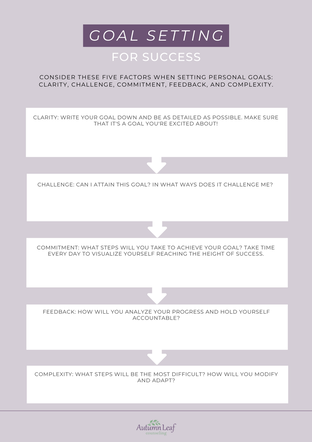|
The new year feels like a fresh start and a great opportunity to establish goals and set yourself up for success. Of course, goals are much easier to create than to follow through on. By the end of February, many of us abandon our determination and settle back into our daily routines. Part of the problem may be that we do not know how to set goals and stick to them, despite our sincere intentions. So, what can you do to stick to your goals and succeed? The following strategies will help you beat the odds. The Psychology of Setting Goals American psychologist Dr Edwin Locke is internationally renowned for his theories on successful goal setting. Locke spent many years researching the theory of goal setting. During this time, he identified five practical principles that need to be in place for us to achieve our goals. According to Locke, we should consider these five factors when setting personal goals: clarity, challenge, commitment, feedback, and complexity. He found that if you follow these principles you will greatly improve your chances of success. Let’s take a look at how to apply this theory. 1. Clarity When your goals are clear, you understand exactly what you're trying to achieve. You know how to measure your progress and you know exactly when you’ve reached your goal. Write your goal down and be as detailed as possible. Consider writing your goal in the form of a personal mission statement for added clarity. Think about how you'll measure your success toward this goal. What specific metrics will you use? Once you've set your goal, consider how it makes you feel. Are you excited? Does the challenge motivate you? If you don't feel strongly about the goal, you might need to clarify it or change it entirely. You should be excited about your goals! 2. ChallengeAccording to Locke, a challenging goal is more motivational than an easy one. Choose a goal that tests your ability and helps you grow as an individual. At the same time, make sure that your goal is realistic. If the challenge is too difficult to achieve, you might lose interest in achieving the goals and lose confidence in yourself. So, ask yourself, can I attain this goal? In what ways does it challenge me? Get real with yourself and your abilities, but try to up the ante. 3. Commitment Once you set your goals, you must put in the time and effort to achieve them. It helps to visualize and manifest what you desire. Here’s how…
You can always add more to your plate. The key here is to keep it simple to maintain longevity and success. Once you’ve decided on your goals, take time every day to visualize yourself reaching the pinnacle of your desires. Manifestation takes you far, even if it is just five minutes of quieting your mind. If you can see it, it is possible. 4. Feedback While the first three elements help you set powerful goals, goal-setting theory also identifies that feedback is key. By receiving feedback, you can identify challenges and find ways to overcome them. Schedule a time once a week to analyze your progress and accomplishments. Look at what has and hasn't worked, and make adjustments along the way. It can also help to have an accountability buddy to provide feedback for each other about the goals you’ve set. The American Society of Training and Development found that people are 65 percent more likely to meet a goal after committing to another person. Their chances of success increase to 95 percent when they build in ongoing meetings with their partners to check in on their progress. You can also give yourself feedback by keeping a journal. Break down your main goals into smaller goals to put into practice as the year goes by. If you are constantly checking in, it helps you stay accountable for your actions or lack of actions. Accountability is a powerful motivational tool. If keeping a journal isn’t your thing, you might want to try out a goal-focused app. There are a variety of planner and tracker apps for this purpose. Goal Buddy, Strides, Milestone Planner, and Habit List are some popular choices. 5. Complexity All our goals are complex in some ways, but we can often be challenged by a task that is more complex than the last. Setting yourself up for success can be as easy as understanding that not all tasks are created equal. Get real with yourself. It can help to give yourself plenty of time to accomplish complex goals. Set deadlines that apply an appropriate amount of pressure, while still being achievable. If you start to feel stressed about meeting your goals, they might be too complex or unrealistic. Reassess both of these areas and modify your goals if necessary. Use this worksheet to create your goals and set yourself up for success. Remember That It's a Process If you follow these simple principles, you will set yourself up for success. Yet, it’s important to remember that it’s okay if you don’t get it right the first time. Be patient with yourself. Understand that working toward your goals is a process. Even if you make a misstep or two, you can restart and continue your journey toward your goal. Never give up. If you’re finding it difficult to set goals and achieve them, then it can help to talk it through with someone you trust. Sometimes it can be hard to achieve things on your own, so having a reliable supporter can help. At Autumn Leaf Counseling we can help you to discover which motivating strategies will work best for you.
0 Comments
Your comment will be posted after it is approved.
Leave a Reply. |
AuthorAs a therapist, Jorie Miklos enjoys helping people reach a level of personal happiness and satisfaction that they didn’t think was possible. Archives
January 2023
Categories |
|
© COPYRIGHT 2020. ALL RIGHTS RESERVED.
|
MENU
|
MENTAL HEALTH CRISIS LINES
If you need immediate help, call 911 or one of the crisis numbers below:
Crisis Line: 312-563-0445 Suicide Hotline: 1-800-273-8255 |
CONTACT
Jorie Miklos, MA, LCPC
Autumn Leaf Counseling 5757 S. Madison St. Hinsdale, IL 60521 630-228-6011 [email protected] |
Website created by Ready Set Go Website Design




 RSS Feed
RSS Feed
